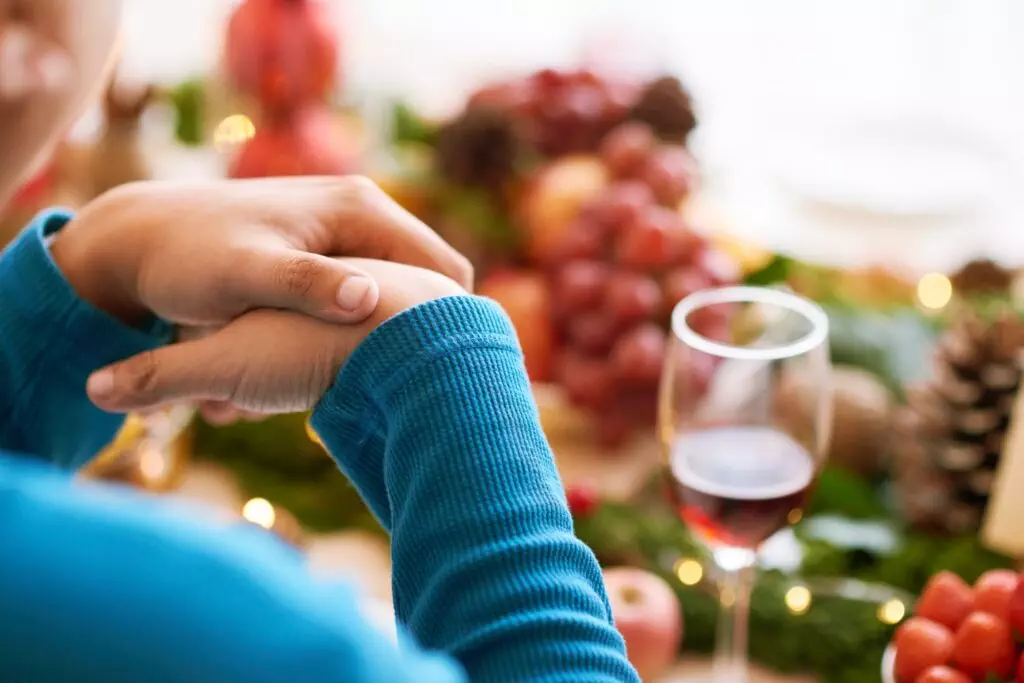For most, the holiday season is a time of joy and celebration, filled with traditions and family gatherings full of festive cheer. However, for those in recovery from substance use, alcohol addiction, or co-occurring disorders, it can be a challenging time.
Addictive substances tend to be more available during the holidays. This can pose significant hurdles for those committed to sobriety, and turn otherwise merry occasions into tests of resilience.
Therefore, to prevent relapse, those in recovery must recognize what they might face during this period, along with the emotional and social pressures that will arise. From the temptation to join in the festive indulgence to the subtle influence of being around others who partake, the holidays can sometimes feel like a heroic trial – one filled with reminders of past habits.
Knowing your potential triggers, as well as being armed with healthy coping techniques, are critical aspects to sticking by your recovery goals. This article will help you preserve the essence of holiday cheer, while bolstering your commitment to a healthier, sober lifestyle.
Statistics on relapse rates during the holidays
Generally, relapse rates hover between 40–60%, and for those in the early stages of recovery the risk is even more pronounced, with multiple relapses common within the first 90 days of sobriety.
However, this already high number increases during the holiday season. From Thanksgiving through New Year’s, there’s a marked uptick in relapse rates. Typically, the readmission rate for past patients is about 25% but during the holidays this figure leaps to over 60%.
This surge can often be linked to the heightened stress and social pressures of the season, where festive activities frequently involve alcohol and, in some circles, party drugs.
And this trend isn’t limited to those in recovery. A study in the Psychology of Addictive Behaviors noted a significant rise in alcohol consumption among young adults during the holidays, with a corresponding spike in alcohol-related fatalities.
Furthermore, the National Highway Traffic Safety Administration reports that daily fatalities from drunk driving rise substantially during this period, from 36 to 45 at Christmastime and up to 54 on New Year’s.
There’s a good reason groups like Alcoholics Anonymous and Narcotics Anonymous refer to the Winter holidays as “The Big Three” (Thanksgiving, Christmas, and New Year’s). These periods of increased alcohol and drug consumption are not to be taken lightly by those in recovery, and must be carefully prepared for in order to manage triggers and avoid relapse.
A guide to potential triggers during the holidays
Managing triggers is a central part of everyone’s recovery journey, but it can be especially challenging during the holidays. Throughout the year, you may be able to avoid or withstand situations where triggers are likely to surface.
However, when the season comes around, so does the obligation to make appearances at social gatherings and family reunions (needless to say most will want to connect with loved ones during this period).
Unfortunately, not everyone is understanding or educated about addiction recovery (even those we love). Therefore, you must remain vigilant and recognize your triggers. This will be vital for developing coping strategies that support continued recovery.

Here’s a closer look at potential triggers:
1. Social events
Holiday gatherings often include the presence of alcohol and drugs and can stir up cravings or feelings of being out of place. Seeing others indulge might evoke a sense of nostalgia or temptation.
2. Stress
The holidays come with their own set of stressors, such as the pressure of gift-buying and preparing for events. This can be overwhelming, especially when trying to balance recovery with holiday demands.
3. Memories
Nostalgic feelings can trigger associations with past substance use. A particular song, scent, or holiday tradition might bring back memories of times when substances were a part of the celebrations.
4. Loneliness
For some, the holidays amplify feelings of isolation, especially if separated from loved ones or facing the season alone. This can be a profound trigger, leading to a desire to return to old coping mechanisms.
5. Pressure to celebrate
The expectation to feel joyous and partake in festivities can feel overwhelming. Seeing photos splashed across social media of people enjoying nights out and having fun can heighten the fear of missing out (FOMO). It can create an internal conflict between wanting to join in and maintaining sobriety.
6. Changes in routine
The holiday season often disrupts regular schedules with vacations, traveling to visit family, parties, and other events. These changes can unsettle daily routines that are so crucial for recovery.
7. Unresolved family conflicts
Interactions with family can bring up unresolved issues and intense emotional challenges. Dealing with these tensions without resorting to past coping strategies can be difficult.
8. Alcohol-free products
Be cautious with alcohol-free products during your recovery journey. They can seem like a safe choice, but their similar taste to alcoholic drinks might unexpectedly trigger cravings. It’s important to gauge your own response to these alternatives and choose what truly supports your sobriety. Remember, opting for a completely different type of drink is always a valid and safe choice.
By understanding these triggers, you can proactively plan and equip yourself with the necessary tools and strategies to navigate the holiday season while firmly staying on your recovery path.
Crafting a “Holiday Relapse Prevention Plan”
Given how common relapse can be during the holidays, creating a relapse prevention plan tailored to this season can be a great help to maintaining your sobriety. Here are some practical steps to consider:
1. Stay connected with a support group
Regular contact with your support network, whether it’s a formal group like AA or NA, or trusted friends and family, is essential. These connections provide a safety net of understanding and accountability.

2. Have an exit strategy for triggering events
Before attending a holiday event, plan how you’ll leave if you start feeling overwhelmed or tempted. This might mean driving yourself so you can leave at any time or having a friend on standby to pick you up.
3. Limit exposure to high-risk situations
It’s okay to say no to events or situations you anticipate will be too challenging. Prioritize your well-being and sobriety over social obligations, especially if they pose even a slight risk to your recovery.
4. Start new sober traditions
The holidays are a great time to create new traditions that don’t involve substances. This could be a movie night, outdoor activities, or volunteer work. New traditions can bring joy and a sense of fulfillment without the presence of substances.
5. Be prepared to say no to substances
Have a response ready for when you’re offered a drink or substance. It can be as straightforward as “No, thank you,” or a brief explanation that you’re living a sober lifestyle.
Remember, your continued sobriety is of more value than any preconceptions about “being a good friend or family member.” If you need to take time out and not partake in the stress-fueled holiday season, that’s completely fine. Staying on track with your recovery is a greater gift to yourself and those in your social circle (even if some might not understand it).
Only you can know how much you can cope with and at what point comfort slips into craving. Be strong. Know which events to avoid, when to politely make your exit, and how to prioritize your needs over misguided entreaties of friends and family.
By incorporating the above steps into your holiday plans, you can strengthen your resolve and enjoy the season while staying true to your journey of recovery.
Keep a focused mindset and practice healthy habits
This becomes especially important when everyday routines give way to the holiday rhythm – this is a time when your commitment to sobriety is both tested and strengthened.
By consciously directing your thoughts and actions each day, you build a resilient foundation that helps you engage with the season’s festivities while staying true to your recovery goals. Here are key strategies to help you maintain this balance:
1. Plan ahead for parties and events
Holidays come with social gatherings that might include substance use. Arrange your own transportation to these events and be mindful of your basic needs like eating and taking mental breaks. Stepping away to breathe or practicing mindfulness can help keep you grounded in your sobriety goals.
2. Be mindful of self-care
At Maui Recovery, we take a mind, body, and spirit approach to healing. This means prioritizing your basic needs – such as nutritious eating, hydration, adequate sleep, exercise, and mental health – as well as your emotional and spiritual needs.
By tuning into yourself, you’ll be better at stepping back from overwhelming situations and making time for enjoyable activities, whether alone or with others. Physical activities and mindfulness practices can help reset your thinking and support sobriety.
3. Replace old habits with new traditions
Create new, sober activities for the holiday season. This could involve starting new traditions with family and friends, such as decorating, baking, or volunteering. Establishing a daily routine that leaves you feeling accomplished can replace old habits with healthier ones, aiding in long-term recovery.

4. Recognize your triggers and use coping methods
While we provided a general list at the beginning of this article, your triggers are unique to you. To prevent relapse during the holidays, ensure you’re acutely familiar with them, and seek professional guidance if you need help identifying and managing them.
Additionally, make sure you have a reliable, trustworthy person to call or text for support – someone who can help you stay on track, assist in removing you from challenging environments, or distract you until you can apply coping methods learned during treatment.
Maintain your routine and engagement
Keeping a consistent schedule during the holiday season is vital, particularly when your regular therapy sessions might be on pause. A structured routine can provide stability and a sense of normalcy, helping you manage time effectively and avoid situations that might lead to relapse.
Engaging in community activities, like volunteering, offers a meaningful way to fill your time. It not only keeps you occupied but also provides a sense of purpose and fulfillment. Volunteering or participating in local events allows you to connect with others, contributing positively to your well-being and reinforcing your commitment to recovery.
These activities can be a powerful reminder of the progress you’ve made and the value you bring to your community, further anchoring your journey in positive experiences.
Journaling can help you stay strong and committed
Not everyone immediately warms to the prospect of journaling, but this practice is a highly effective tool for recovery.
For example, Dr. Amy Krentzman’s research explored journaling practices specifically designed for addiction recovery, such as Positive Peer Journaling. Her studies have shown improvements in well-being, addiction recovery, and mental health-related factors among participants.

During the holiday season, journaling can serve as a great way to regularly anchor yourself to your commitment to sobriety. Here are seven key benefits:
- Stress relief – Writing down thoughts and emotions can significantly reduce stress levels, crucial for managing recovery challenges during the season.
- Reducing anxiety – Known to be extremely cathartic, journaling provides a space to process and work through feelings of anxiety, promoting reflection and understanding.
- Feeling of accomplishment – Keeping a journal helps track progress and growth, bringing about a sense of accomplishment over time.
- Helps you stay focused on goals – Journaling offers a structured way to concentrate on and track recovery goals and aspirations. This can help you maintain a healthy routine throughout the holidays.
- Promotes inner peace and emotional awareness – Regular writing fosters emotional awareness and contributes to inner peace, aiding in the effective processing of feelings.
- Offering new perspectives – Expressing thoughts and emotions on paper allows you to gain fresh insights and perspectives on your recovery journey.
- Relapse prevention – As a coping tool, journaling can aid in identifying and addressing triggers and temptations that could potentially lead to relapse, offering a means to calm the mind and focus on personal growth and healing. This is also backed up by research, with one study showing that journaling was effective at reducing alcohol relapse rates among young adults.
If in doubt, reach out!
There can be a tendency for those who deal with addiction to suffer in isolation. You may feel ashamed, or that you don’t want to be a burden – feelings that can be exacerbated during the holidays. This is why you must reach out for support during your recovery journey, especially during times when you feel overwhelmed or uncertain.
Remember, seeking help is a sign of strength, not weakness. Whether it’s connecting with a support group, a trusted friend, or a professional at a recovery center, these connections can offer invaluable guidance, support, and understanding.
You’re not alone in this. Embracing the support of others can provide the encouragement and perspective needed to navigate your path. Every conversation, every shared experience, adds to your reservoir of strength and resilience. Take the brave step of reaching out when you need help, and you’ll find a community ready to stand with you, no matter what the holidays bring.
Maui Recovery – Helping you stay sober throughout the holidays

Maui Recovery’s approach aims to support your long-term recovery, equipping you with the resilience and tools you need to remain sober all year round. And yes, this includes the often stressful holiday period!
Our holistic program combines experiential therapies and evidence-based therapies, all tailored into a personalized plan best suited to your recovery.
For more insights into managing addiction recovery during the holidays, or to learn about our comprehensive approach, please reach out to us. At Maui Recovery, we’re committed to your continued growth and success, helping you find fulfillment and peace this holiday season and beyond.
Contact us today and find out how we can help.









